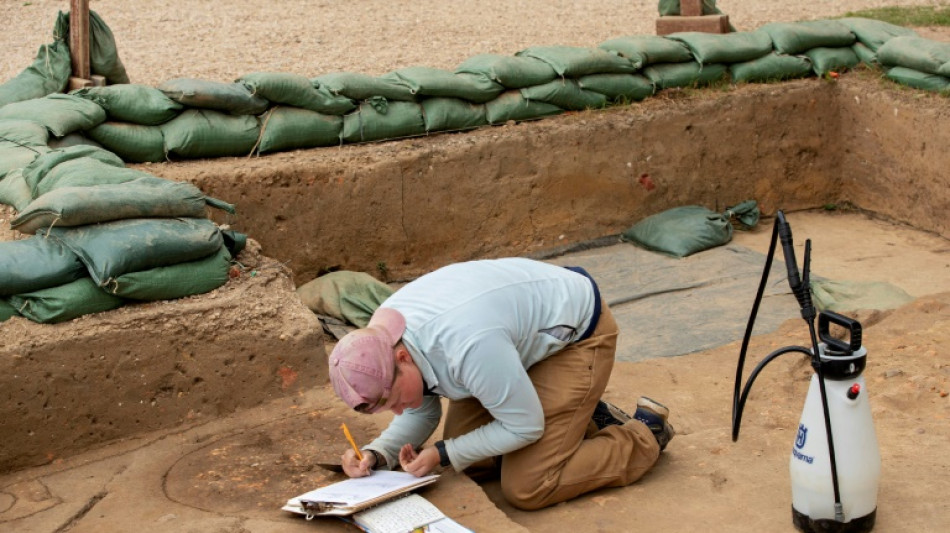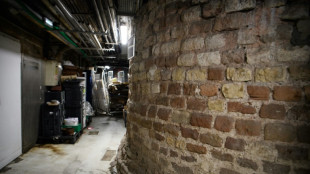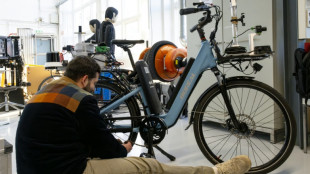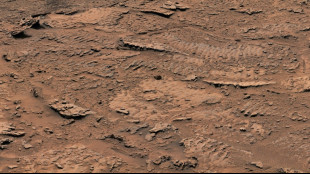
-
 Between laughs and 'disaster', Trump divides Davos
Between laughs and 'disaster', Trump divides Davos
-
Hundreds of people protest ahead of Swiss Davos meeting

-
 US falling behind on wind power, think tank warns
US falling behind on wind power, think tank warns
-
US news giant CNN eyes 200 job cuts, streaming overhaul

-
 Rubio chooses Central America for first trip amid Panama Canal pressure
Rubio chooses Central America for first trip amid Panama Canal pressure
-
Wall Street's AI-fuelled rally falters, oil slumps

-
 Trump tells Davos elites: produce in US or pay tariffs
Trump tells Davos elites: produce in US or pay tariffs
-
Progressive politics and nepo 'babies': five Oscar takeaways

-
 American Airlines shares fall on lackluster 2025 profit outlook
American Airlines shares fall on lackluster 2025 profit outlook
-
France to introduce new sex education guidelines in schools

-
 Wall Street's AI-fuelled rally falters
Wall Street's AI-fuelled rally falters
-
Drinking water in many French cities contaminated: study

-
 After Musk gesture, activists project 'Heil' on Tesla plant
After Musk gesture, activists project 'Heil' on Tesla plant
-
ICC prosecutor seeks arrest of Taliban leaders over persecution of women

-
 Syria's economy reborn after being freed from Assad
Syria's economy reborn after being freed from Assad
-
Shoppers unaware as Roman tower lurks under French supermarket

-
 Stocks mainly rise after Wall Street's AI-fuelled rally
Stocks mainly rise after Wall Street's AI-fuelled rally
-
Singer Chris Brown sues Warner Bros for $500 mn over documentary

-
 J-pop star Nakai to retire after sexual misconduct allegations
J-pop star Nakai to retire after sexual misconduct allegations
-
Leaky, crowded and hot: Louvre boss slams her own museum

-
 WWF blasts Sweden, Finland over logging practices
WWF blasts Sweden, Finland over logging practices
-
How things stand in China-US trade tensions with Trump 2.0

-
 Most Asian markets rise after Wall Street's AI-fuelled rally
Most Asian markets rise after Wall Street's AI-fuelled rally
-
Fire-hit Hollywood awaits Oscar nominees, with 'Emilia Perez' in front

-
 New rider in town: Somalia's first woman equestrian turns heads
New rider in town: Somalia's first woman equestrian turns heads
-
Most Asian markets extend AI-fuelled rally

-
 Bangladesh student revolutionaries' dreams dented by joblessness
Bangladesh student revolutionaries' dreams dented by joblessness
-
Larry Ellison, tech's original maverick, makes Trump era return

-
 Political crisis hits South Korea growth: central bank
Political crisis hits South Korea growth: central bank
-
Photonis Launches Two Market-Leading Solutions to Advance Single Photon Detection and Imaging Applications

-
 Les Paul owned by guitar god Jeff Beck auctioned for over £1 mn
Les Paul owned by guitar god Jeff Beck auctioned for over £1 mn
-
Musk bashes Trump-backed AI mega project

-
 Does China control the Panama Canal, as Trump claims?
Does China control the Panama Canal, as Trump claims?
-
Yemen's Huthis say freed detained ship's crew after Gaza truce

-
 Mel B, Trump and Milei: What happened at Davos Wednesday
Mel B, Trump and Milei: What happened at Davos Wednesday
-
Argentina's Milei says would leave Mercosur for US trade deal

-
 Fashion world 'afraid' of Trump, says Van Beirendonck
Fashion world 'afraid' of Trump, says Van Beirendonck
-
P&G sees China improvement but consumers 'still struggling'

-
 Stock markets mostly higher as they track Trump plans, earnings
Stock markets mostly higher as they track Trump plans, earnings
-
Anti-Semitic acts at 'historic' highs in France despite 2024 fall: council

-
 Trump's meme coin venture sparks backlash
Trump's meme coin venture sparks backlash
-
Global green energy push likely to continue despite Trump climate retreat: UN

-
 Prince Harry settles lawsuit against Murdoch's UK tabloids
Prince Harry settles lawsuit against Murdoch's UK tabloids
-
Stock markets diverge tracking Trump plans

-
 Sudan 'political' banknote switch causes cash crunch
Sudan 'political' banknote switch causes cash crunch
-
Masa Son, Trump's Japanese buddy with the Midas Touch

-
 Borussia Dortmund sack coach Nuri Sahin after Champions League setback
Borussia Dortmund sack coach Nuri Sahin after Champions League setback
-
'Love for humanity': Low-crime Japan's unpaid parole officers

-
 Brazil saw 79% jump in area burned by fires in 2024: monitor
Brazil saw 79% jump in area burned by fires in 2024: monitor
-
No home, no insurance: The double hit from Los Angeles fires


Jamestown, cradle of America, threatened by rising seas
The waters rose overnight and by morning formed a shallow pond over the grassy field covering a cemetery in Jamestown, one of the founding sites of the American nation.
Curators -- their feet wet from the water -- say it is just the latest in a seemingly endless series of flooding at the first permanent English settlement in North America, a location that was also home to Native American tribes for thousands of years.
Sandbags and tarps provide some protection from the elements, but curators warn that time is running out for Jamestown, which is increasingly under threat from rising sea levels and extreme weather as climate change takes its toll.
"All of the archeological resources that we haven't had a chance to investigate yet could be destroyed," said Michael Lavin, director of collections at Jamestown Rediscovery Foundation, the association in charge of the site in the US state of Virginia.
Earlier this month, the National Trust for Historic Preservation, a leading heritage institution, placed Jamestown on its 2022 list of the country's 11 most endangered historic sites.
- 'Need to do something' -
"We need to do something, and we need to do it now," said Lavin, fording a flooded path to get to his office.
David Givens, director of archeology, has like his colleague worked here for more than 20 years.
"For most of our lives, this is a dry area," he said.
The flooding today has risen by a meter (yard), a level that will be the norm by the end of the century, according to average projections.
"This is a perfect example of sea level rise, climate change and how it's affecting us," said the archeologist.
Sea levels at the mouth of the James River have already risen 18 inches (45 centimeters) since 1927.
Worries run high, given that the site is a distillation of so much American history: in addition to the English settlers, it was home to native American tribes for 12,000 years and, in 1619, was the first place that African slaves were brought in Britain's North American territories.
- Bones 'like sponges' -
At the foot of the old church, archeologist Caitlin Delmas scrapes at the ground with her trowel, surrounded by the sandbags and tarps that are deployed with each downpour.
"That's also a lot of added stress, because you have to make sure that everything's staying dry," she said.
In 2013, a study of the bones of a young woman found here made it possible to confirm that she had been the victim of cannibalism during a famine the colonists suffered during the winter of 1609-1610.
But such rare discoveries may never be made again: Delmas said recently unearthed bones were "like sponges," and cannot be analyzed due to too much alternation between being dry and wet.
Givens said it is "almost like in war, like a trench and sandbags, because it's a constant fight for us."
"Over time, those archaeology sites will be inaccessible, they'll be eroded from saltwater, inundation," he said, adding: "That's I think what scares me most."
Marcy Rockman, a pioneer in the study of the impact of climate change on cultural resources in US national parks, said cultural heritage sites "have always been affected by storms and wind and rain."
"But it's more that those forces are accelerating. They're intensifying. They're recombining in new ways. They're coming at different times of the year" due to climate change, she said.
In the wide estuary facing Jamestown, a handful of barges are bringing blocks of granite, waiting for more favorable weather to come and reinforce the existing sea wall that was built at the beginning of the 20th century to protect the site from the erosion.
The project, costing more than $2 million, is only a first step: studies are being launched into the flooding, and "it's going to cost tens of millions of dollars," said Lavin.
In Jamestown, the ebb tide has relieved the flooding a little, leaving fish splashing above the old cemetery that has never been properly excavated, and which will soon turn into a swamp if nothing is done.
"Human remains are our data recorders for the past," said Givens. "There's some urgency to studying that."
Katherine Malone-France, head of conservation at the National Trust for Historic Preservation, said in her Washington office that the clock is ticking.
"We have a five year window at Jamestown to begin to seriously mitigate the impacts of climate change," she said. "It's urgent."
P.Petrenko--CPN



